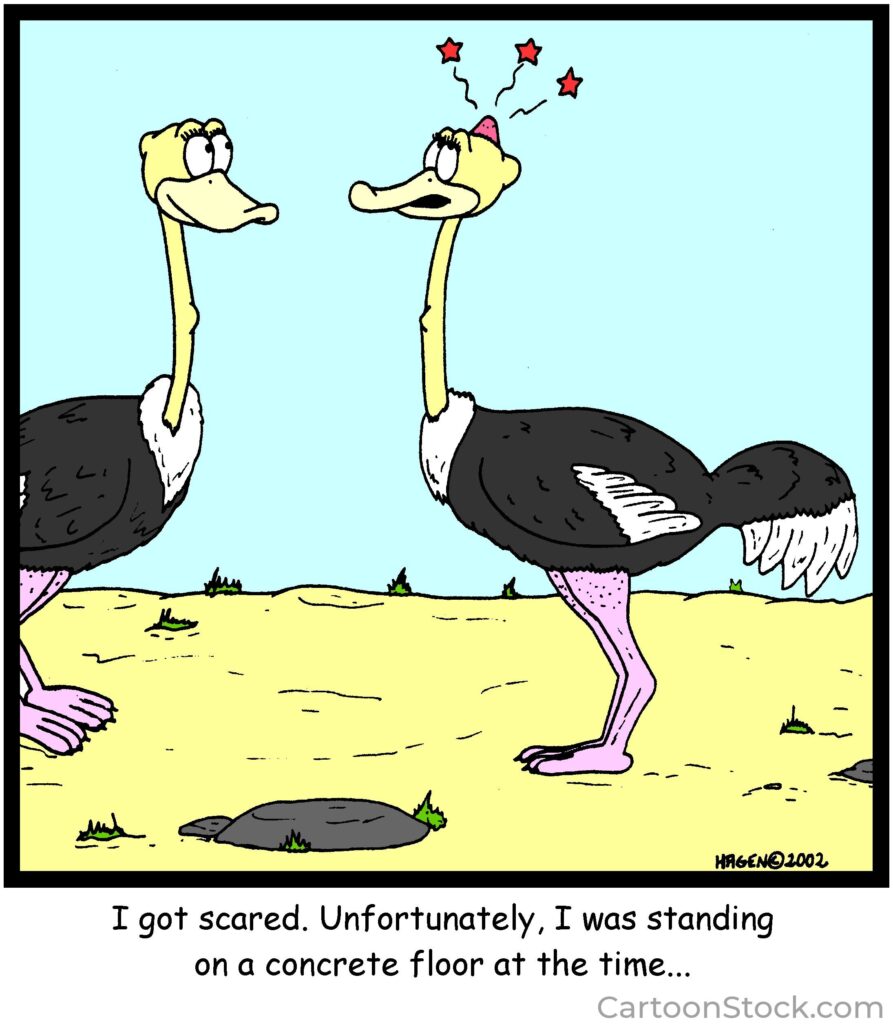
For the last 14 months of its life, the check engine light in my old Subaru Forester (230,000 miles) was constantly on. I would fix one issue that triggered the alarm and then another would flare up. I became so weary of the issue that I didn’t even want to have it checked out. I just ignored the light and would have disconnected it had I known how to.
Years ago (before Mary and I vowed to live debt-free) when our credit card bill would get out of hand, I avoided checking the balance because I knew it was high and out of control.
In both cases, I was exhibiting the ostrich effect (OE).
According to a persistent myth, ostriches bury their heads in the sand when they’re scared or feel threatened. They think they are safe if they can’t see the danger. (They don’t really do that.)
The ostrich effect is a cognitive bias that causes people to avoid information that they perceive as potentially unpleasant. From a psychological standpoint, OE is the result of the conflict between what our rational mind knows to be important and what our emotional mind anticipates will be painful. Instead of helping, it drains us of time, energy, and resources and offers nothing of value in return.
Here are some examples of the ostrich effect
- You may avoid getting a professional medical diagnosis because you’re afraid of hearing bad news (although, ironically, health information is crucial for health maintenance).
- You regularly check your retirement fund when the market is going up but not when it’s going down (although, to manage your money wisely, you need consistent data).
- Parents may hesitate to have a child who is having trouble in school tested.
- A business executive may postpone delving into what may be problems in the organization.
As is often the case with cognitive biases, the first step towards clarity is self-awareness. We must realize and admit that we’re falling prey to unhealthy thinking. I think the ostrich effect is one of the easiest biases to recognize: Just identify areas in your life in which you’re procrastinating or reluctant to get information because you think it might be bad news.
The antidote to the ostrich effect is also simple and straightforward: Immediately pursue areas that you’re avoiding and pursue them aggressively. Put them at the top of your to-do-list; pledge that you’ll not eat again until you address the issues.
The ostrich effect offers no value—there’s no upside—but overcoming it is very beneficial. As the Bible says, “The truth will set you free,” even if the truth is unpalatable.

Good post! Valuable.
Thanks, Rhonda, for taking the time to respond. Don
Thanks Don. I tend to be an ostrich sometimes. I will work on that. Bonnie Bailey
Thanks, Bonnie, for taking the time to write. We all need to avoid the ostrich effect. Don
Yes, transparency is great. I myself came from a more fear-based background and learned much from my husband. For example, there’s no need to skirt around an issue in fear when asked about something: simply answer directly (the truth WILL set you free), or say you’d rather not discuss it at that time. Just be real. And if you don’t know something, seek out some help (no human knows everything).
Jan, thanks for taking the time to respond. I like your thought, “say you’d rather not discuss it.” Great phrase. Don
Don, The cartoon always gets my attention and the articles are always thought provoking and sooner or later I reference them in lessons I teach. Way behind on e-mails right now BUT these I always save and get back to. Thanks!
Mark, thanks for kind and encouraging comments. I’m glad you find some of my thoughts beneficial. Don
Don,
As always, well written.
One comment I would add…more often then not, the “fear” we look to avoid facing usually ends up not being that bad. In fact, the procrastination adds more stress to ourselves then the result of facing our fears. Adding Romans 8:28 to the equation can instill a great deal of confidence when facing the uncertain.
Chad
Chad, thanks for taking the time to respond. I like your thought “procrastination adds more stress.” How true. Sometimes, the thing we are hiding from is not significant. Don
I’m pretty sure we all can be “hiders” given the right circumstances. I know I “am”, but more “was” at this stage of life. The heaviness of procrastination just ain’t worth it any longer. My relationship with God depends on studying His Word, whether I feel like it or not. I have learned the disciplined life is so much more carefree in the end. Like the sports ad of years back, “just do it” . Feels great. Thank you, Don for this thinking site.
Kay, thanks for taking the time to respond. I like your comment “the disciplined life is so much more carefree in the end.” Take care. Don